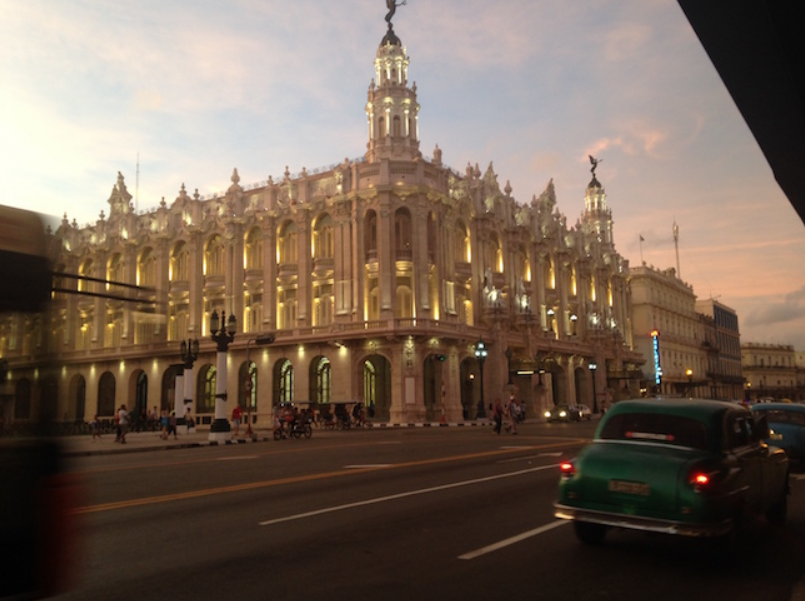“On February 3, 1962, President John F. Kennedy imposed the U.S. embargo on Cuba. The 60th anniversary of the embargo is a stark reminder of the United States’ policy failures of the longest lasting series of sanctions in its foreign policy history. Today, more than half a century since the embargo was put in place, the Biden administration continues to uphold this symbol of hostility between the U.S. and Cuba in the midst of the most challenging humanitarian crisis on the island since the 1990s.” A statement published by the Washington Office on Latin America in 2022, it still stands true today.
The Campus to Cuba program, coordinated by Dr Stuart Schussler of the Autonomous University of Social Movements and an alum of DePauw, enables students to learn firsthand the effect of the embargo by exploring both urban and rural Cuba. Living with local host families, limited access to wifi and exposure to experiential learning in the form of museum, school and medical center visits make it an enriching two weeks for participants in the program. Getting to know the communities surrounding their homestays allows students to build lasting bonds with the people they meet and talk to. Dr Schussler appreciates the relaxed environment that creates opportunities for students to learn about the history of the socialist system, which nourishes the movement for social justice back in America. Practicing Spanish is also a big part of the experience, as Professor Angela Castaneda observes – being in Cuba creates a free and welcoming environment for Latinx students to speak the language uninhibitedly. It is a beautiful thing, she states, for Spanish to go from something they were judged, stereotyped or mocked for in the United States, to a valued and positive part of their identity that they can be proud of.
At the short film screening in Roy O. West library on Monday, September 25th, faculty members, students and collaborators gathered to hear about the experiences of participants in past programs, and as an added benefit, got to eat delicious Mexican Conchas. There was a general sense of community and solidarity that students observed over their two weeks in Cuba, something that they found lacking in most parts of the United States. While there seems to be a culture of individualism and selfishness here, they identified the overarching symbiosis and support that they believe to be the reason Cuba is holding it together in the face of their hardships. A few students opted for the program to learn more about the healthcare system, while others felt a personal connection, or the wish to study abroad, was the reason they chose it. Whatever their reasons, all the students interviewed in the film came back from the trip with a newfound awareness and understanding of society.
More than anything, it is important that students go there to learn, rather than “help” or “volunteer”, as Dr Dennis Sloan points out. With 8 hours of classes per week and many workshops, academic, social and political experts, visits and field trips that help broaden students’ knowledge and enrich their education, their remaining time goes to building real, equal relationships with local people. A typical day had an early start with breakfast and a bus ride to their three hour class, punctuated with coffee breaks. This was followed by lunch, brought by one of the host families on a moped (about which there was much excitement), and then depending on the day, excursions to either a historical monument or community center. Additionally, Dr Schussler is excited to expand the list with spaces like the Latin American School of Medicine and the Center for Sexual Education, and incorporate regular conversations with Cuban university students.
Sometimes there were chances to just relax, play with children in the neighborhood and interact with various people without the distraction of phones and social media. There were also opportunities to partake in cultural activities and talent shows, as well as dance classes that one student said was a fun outlet for expression of identity. All of these experiences cultivated a sense of belonging and genuine interaction, something that people got to carry as a new part of themselves back to the States.
One student mentioned that prior to the trip, they were hesitant and wary of being in a completely new environment – not knowing Spanish and without much experience of travel outside the US. However, on interaction with their host family, the student felt welcomed and even fostered a mutually beneficial relationship with someone who wanted to learn more English, teaching them Spanish in return. Another student was notified of a family emergency back in the States, and was cared for by her host family, who were comforting and empathetic during the tough time she had. Professor Castaneda appreciates witnessing students’ eyes light up taking in Cuba for the first time, and the gradual breaking down of their preconceived notions about Cuban society and culture. Since she has been a part of the program for many years, she loves reconnecting with people she has worked with before to sustain their relationships and showcase solidarity with them.
There are still things that can make this already wonderful opportunity and experience even better; more time before the trip to prepare and unpack people’s positionalities, assets or challenges in context of the course and the country, Professor Castaneda mentions. She wishes for the realizations and impact of the trip to be more continuous and structured after returning, since it is easy to get caught up in one’s daily life again. Finally, she states, the spaces that the program centers around are not accessible to people with disabilities, since the blockade against Cuba restricts access to resources to build the kind of inclusive and convenient infrastructure they need. Overall, though, the Campus to Cuba program offers an enriching opportunity to learn more about and be integrated in a community with different values, systems and lifestyles than those we are accustomed to.

